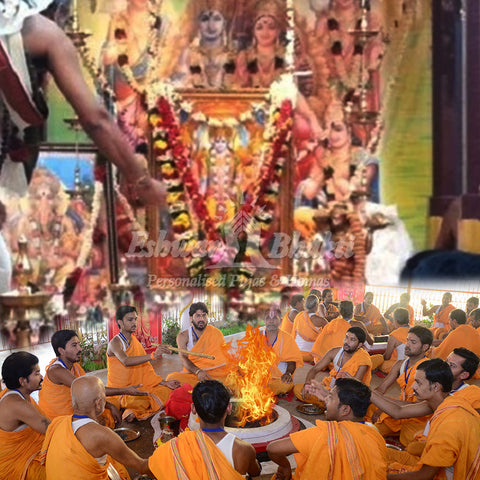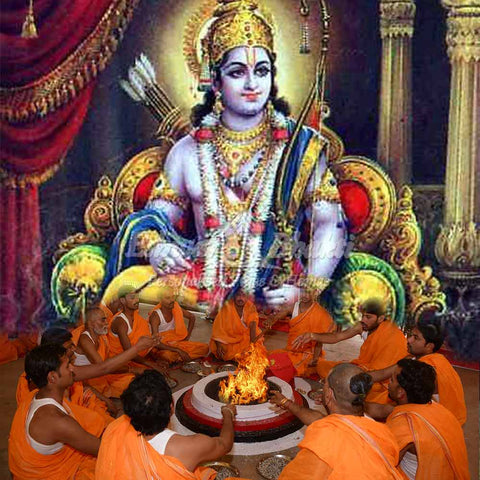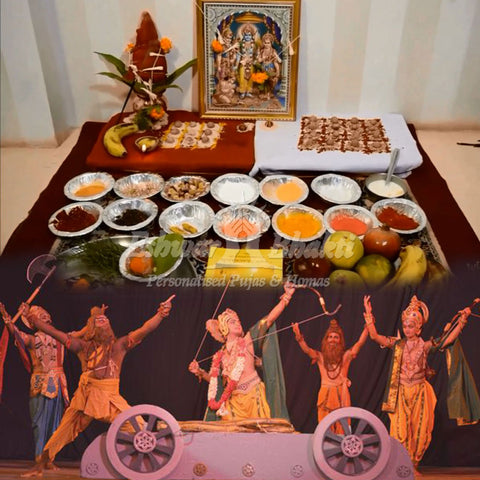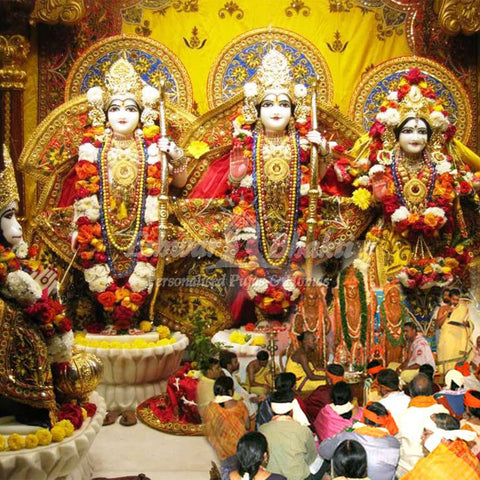Rama Navami
 Maryada Purushottam Rama is the seventh avatar of the Hindu God Vishnu. Lord Rama is the most widely worshipped Hindu deity, the embodiment of the ideal of chivalry and virtue. Hindus living all over the world celebrate Ramnavami as the birth anniversary of Lord Rama. According to the Hindu calendar, this auspicious festival of Ramnavami falls during Shukla Paksha or the waxing moon phase, on the ninth day of the Hindu month Chaitra. According to mythology, Ramnavami is one of the five major Hindu festivals. On this day, devotees observe a complete fast and recite verses from the holy scriptures like Shrimad Bhagavatam, Rama Charita Manas, and Ramayana. The festival of Ramnavami is also celebrated by performing the ceremonial wedding of Lord Rama and His consort Goddess Sita.
Maryada Purushottam Rama is the seventh avatar of the Hindu God Vishnu. Lord Rama is the most widely worshipped Hindu deity, the embodiment of the ideal of chivalry and virtue. Hindus living all over the world celebrate Ramnavami as the birth anniversary of Lord Rama. According to the Hindu calendar, this auspicious festival of Ramnavami falls during Shukla Paksha or the waxing moon phase, on the ninth day of the Hindu month Chaitra. According to mythology, Ramnavami is one of the five major Hindu festivals. On this day, devotees observe a complete fast and recite verses from the holy scriptures like Shrimad Bhagavatam, Rama Charita Manas, and Ramayana. The festival of Ramnavami is also celebrated by performing the ceremonial wedding of Lord Rama and His consort Goddess Sita.
Valmiki Ramayana (widely accepted holy scripture) and some modern astrological studies describe that Lord Sun is an ancestor of Lord Rama and Lord Rama was born to queen Kaushalya and King Dasharatha in Ayodhya. As per astrological calculations, these experts suggest that the date of birth of Lord Rama is January 10 at 12.05 hours, 5114 BC. On this pious day, devotees offer water and worship Lord Sun early in the morning.
Ramnavami Rituals: On this very significant day devotees observe a day-long fast which starts in the morning and extends till the next morning. They worship Lord Rama, Goddess Sita, and His younger brother Laxman by listening or narrating the epic Ramayana. The temples of Lord Rama perform the ceremonial wedding of Lord Rama and Goddess Sita and also conduct grand procession in the evening carrying the idols on a Ratha. On this auspicious day, devotees collectively organize bhajans and kirtans for an entire day. Some of the devotees observe a strict fast and refrain from the consumption of food and water.
Ayodhya, the birthplace of Lord Rama celebrates Ramnavami by lighting millions of Diyas (lamps). Thousands and thousands of devotees from far-flung places come to Ayodhya, take a holy bath in river Sarayu, and visit Rama temple to participate in the grand ceremony.
In some parts of India, the festival is called ‘Sri Rama Navaratra’ that lasts for nine days starting from the first day of Chaitra and ending on Ram Navami. A variety of rituals are observed during this 9-day period. Every day, devotees offer varieties of fruits and flowers to the deities. They distribute Prasad, community meals to the people. Programs like Akhanda Ramayana, Ratha Yathra, or Sobha Yathra and other activities are conducted during this period.
Mantras to chant on this day:
• Om Shri Ramaya Namah॥
• Shri Rama Jaya Rama Jaya Jaya Rama ॥
• Hare Rama Hare Rama, Rama Rama Hare Hare
Hare Krishna Hare Krishna, Krishna Krishna Hare Hare ॥
• Om Dasharathaye Vidmahe, Sitavallabhaya Dhimahi,Tanno Rama Prachodayat॥
Significance of Ram Navami:
• It teaches the goodness of choosing dharma and victory of good over evil.
• People believe that worshipping Rama on this day helps in removing bad karmas and influences from their life. It also marks the entrance of righteousness, happiness, and prosperity in a person’s life.
• Lord Rama who is also known as Purushottam, Satcharitra, King of Kings, is an ideal son, an ideal brother, an ideal husband, an ideal friend, and an ideal king. Thus, the festival of Ramnavami reminds us to saturate our minds, to follow the path of Lord Rama to live a blissful life.
Traditional foods prepared during Ram Navami: Indian festivals are incomplete without delicious foods and Ram Navami is no different. Indians prepare different types of foods that are offered to the deity as bhog, or prasad. Few of them are, as follows-
• Panakam – It is a drink that is prepared by using jaggery, cardamom, and dry ginger. A simple and healthy drink perfect to drink at the onset of summer.
• Coconut laddoos – These are made with jaggery, grated coconut, and milk. Most of the devotees prepare this sweet at home to offer as bhog.
• Makhana kheer – It is prepared with butter, sugar or jaggery, and milk. This makes an amazing mouth-watering substitute to rice kheer.
• Dates halwa – Several temples prepares this amazing delight during this day to be offered to the deity and served as prasad to a large crowd.
Followers of Lord Rama not only prepare sweets but also, prepare grand feasts and serve to people in order to seek blessings from Lord Ram.
The Legend: Ramayana is one of the great epic poems of India which was written by the sage Valmiki. The Sanskrit poem describes the royal birth of the God Rama in the kingdom of Ayodhya. As per this holy book, the Suryavansi King Dasharatha has three wives named Kausalya, Kaikeyi, and Sumitra. Prince Rama was born to elder queen Kausalya and his brothers were Bharata (born to Kaikeyi), Lakshmana, and Shatrughna (both born to Sumitra). The epic story describes that Lord Rama is the 7th incarnation of Lord Vishnu who took birth on earth on his own will to establish Satya (truth), dharma (righteous duty), and to vanquish adharma (unlawful activities).
The epic says, Rama was banished from his position as heir to the kingdom and was sent to exile with his wife Sita and younger brother, Lakshmana, for a period of 14 years. During this difficult period Ravana, the demon king of Lanka, kidnapped Sita. And after a series of events Lord Rama slays Ravana and rescues Sita. This part of the epic gives a universal message of dharma versus adharma or victory of virtue over vice.
The holy scripture Ramayana enjoys immense popularity in India and abroad. As per the teachings of Puranas, recitation of the verses of this holy text is an act of great merit.
Summary: Lord Rama is considered the Supreme Being and a major deity in Hinduism. Lord Rama is one of the most popular incarnations (avatar) of God Vishnu. For Hindus, there is nothing bigger, better, and lovable than worshipping Lord Rama. The birth anniversary of Lord Rama known as Ramnavami is one of the most auspicious festival of India.








